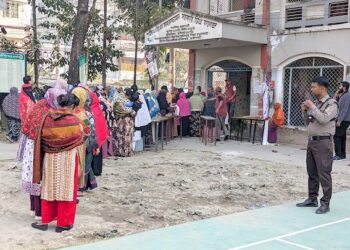A damning new report from Rutgers Law School has exposed how Hindu supremacist organisations are threatening American pluralism, spreading anti-Muslim hate and perpetuating discriminatory conduct whilst exploiting the country’s unfamiliarity with India’s far-right political movements.
The 68-page study, titled “Hindutva in America: A Threat to Equality and Religious Pluralism“, examines the origins, networks and impacts of Hindu nationalist organisations operating across the United States, revealing a transnational movement that claims to represent all Hindus whilst advancing an exclusionary political agenda rooted in Hindu supremacy.
“Hindutva is a transnational far-right political ideology grounded in Hindu supremacy,” explained Professor Sahar Aziz, director of the Centre for Security, Race and Rights at Rutgers Law School, which produced the report. “In India, Hindu nationalists advocate a strict form of ethnonationalism that reimagines the secular Indian republic as exclusively a Hindu nation and seeks to relegate religious minorities, especially Muslims, to an inferior status.”
The report highlights how these groups have capitalised on post-9/11 anti-Muslim sentiment to gain mainstream acceptance. “By couching their rhetoric within the mainstream narrative that Muslims worldwide are presumptively terrorists and violent, Hindutva organisations join the chorus of other anti-Muslim right-wing groups,” the study states.
Historical roots in fascism
The report traces Hindutva’s ideological origins to the 1920s Rashtriya Swayamsevak Sangh (RSS), a paramilitary organisation whose early leaders admired Nazi Germany and fascist Italy. One RSS founder, MS Golwalkar, wrote approvingly of Hitler’s treatment of Jews, stating: “To keep up the purity of its race and culture, Germany shocked the world by her purging of the country of the Semitic races, the Jews. Race pride at its highest has been manifested here. A good lesson for us in Hindustan to learn and profit by.”
Dr Dheepa Sundaram, assistant professor of Hindu studies at the University of Denver, emphasised the movement’s exclusionary nature during a panel discussion on the report. “Hindutva sees Muslims and Christians as outsiders whilst viewing what they would see as Indic religions like Jainism, Sikhism, Buddhism as ethnically a Hindu tradition,” she explained.
The RSS remains the ideological source of India’s ruling Bharatiya Janata Party (BJP), with Prime Minister Narendra Modi having found his political roots in the organisation.
American operations and influence
Since the 1970s and 1980s, corresponding with increased South Asian immigration to the United States, numerous Hindutva-aligned organisations have established themselves across America. These include the Vishwa Hindu Parishad of America (VHPA), founded in 1970, and more recently the Hindu American Foundation (2003) and the Coalition of Hindus of North America (CoHNA, 2020).
The report details how seven US-based Hindutva groups have spent more than $158 million on various projects over the past two decades, including influencing members of Congress to support policies favourable to India’s far-right government.
“These organisations find common cause historically and in the present moment with extremist ideologies and groups including Islamophobia, white nationalism and supremacy as well as Zionism,” Dr Sundaram noted, pointing to their appearance at events like the 2024 National Conservatism Conference alongside Christian nationalist figures.
Impact on American Muslims
Safa Ahmed, associate director of media and communications for the Indian American Muslim Council, shared personal experiences of Hindu supremacist bigotry. “I actually grew up in a part of North Carolina that was at the time majority white,” she recounted. “The people I faced the most direct and personal anti-Muslim bigotry from was not southern white Americans, but actually fellow Indian Americans, as young as when I was in first grade.”
Ahmed highlighted research showing that between 2017 and 2019, India comprised 55% of all anti-Muslim hate speech on social media platform X globally. “You cannot talk about Islamophobia in the United States without now including Hindu supremacy in the conversation,” she argued.
A 2024 survey conducted by the Indian American Muslim Council found that 81% of nearly 1,000 Indian American Muslim respondents reported experiencing harassment, discrimination or prejudice from Hindu friends or social contacts over the past decade, with 70% experiencing biased treatment from Hindu colleagues in the workplace.
Threats to Sikh Americans
Jyot Singh, research and policy consultant at the Sikh American Legal Defence and Education Fund, detailed how Hindu supremacist groups have targeted Sikh Americans through transnational repression. He cited the 2023 assassination of Hardeep Singh Nijjar in Canada and plots against US-based activists like Gurpatwant Singh Pannun.
“Hardip died for his beliefs. He died for his politics,” Singh stated, noting that subsequent US Department of Justice indictments revealed these plots were allegedly orchestrated by the Indian government.
California Assembly member Dr Jasmeet Bains, who introduced anti-transnational repression legislation, has required round-the-clock police protection and relocated her residence due to threats. “She has been the subject of false immigration tips,” Singh revealed. “She was born in Bakersfield. She’s an American citizen, but she’s had to deal with three different fake immigration tips to ICE alleging that she needs to be deported.”
Progressive Hindu voices push back
Pranay Somayajula, organising and advocacy director for Hindus for Human Rights, emphasised the importance of Hindu voices opposing supremacist ideology. “It’s important, given that this is a movement that both in India but also in the diaspora claims to speak on behalf of Hindus,” he explained. “Particularly well-meaning liberals in mainstream civil society sort of take that at face value.”
Somayajula criticised how Hindu supremacist groups weaponise claims of “Hinduphobia” whilst simultaneously “cozying up to the MAGA movement, cozying up to white Christian nationalists. The leaders of the Hindu American Foundation were at Donald Trump’s inaugural ball standing alongside January 6th insurrectionists.”
Community response
The Coalition of Hindus of North America has launched an email campaign to Rutgers University opposing the report, claiming it promotes “Hindu hate” and demanding the university distance itself from the study. However, the report’s authors maintain their research is empirically grounded and theoretically sound.
Recommendations
The Rutgers report makes five key recommendations: that law enforcement, politicians and civil rights groups cease partnerships with US-based Hindu nationalist organisations; that federal authorities ensure such groups register under the Foreign Agents Registration Act when acting as RSS proxies; that Hindu nationalist charities be transparent about foreign financial links; that the US government impose sanctions on persons facilitating anti-minority violence in India; and that universities educate themselves about Hindutva-inspired discrimination.
“This type of work is not easy. It tends to invite the very hate and bias and harassment that the centre’s mission seeks to stop,” Professor Aziz acknowledged. “But these Islamophobic or anti-Arab or anti-South Asian responses paradoxically and unfortunately validate why CSRR’s work is so important.”
The full report is available at csrr.rutgers.edu.











